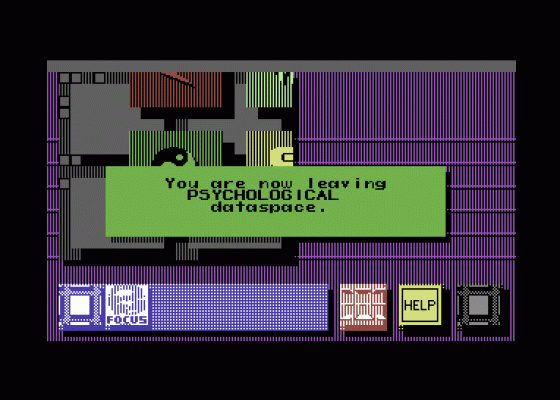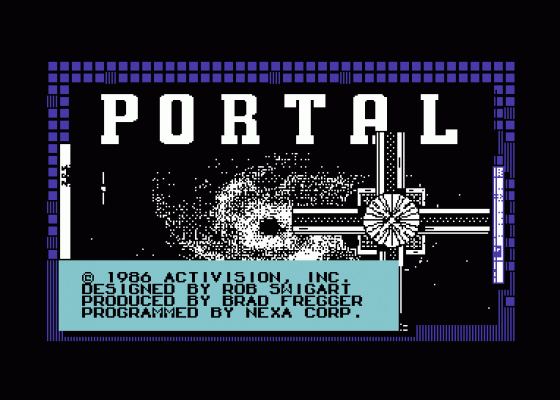
Computer Gamer
 1st April 1987
1st April 1987
Categories: Review: Software
Author: Gordon Hamlett
Publisher: Activision
Machine: Commodore 64
Published in Computer Gamer #25
When is a door not a door? Gordon Hamlett passes through the portal in an attempt to discover why a few billion people have suddenly disappeared.
Portal
The mission was a total disaster from start to finish. It was supposed to be a single man explorer telemetry mission to 61 Cygni, but I never got there. Next the computers on my ship, the Gyges, played up on my return journey to Earth, intercepting signals they couldn't decode. But that was nothing to what I found when I reached Earth. If I'd known then what I know now, I don't think I'd have bothered to land.
The entire world seemed to be deserted. Washington and New York were totally devoid of human life. It was all underground now of course. They had started before I had left and the project seemed to have been finished long ago but none of the machiner was working. The only bodies I could find were in a hospital and had been there so long they had mummified.
At long last, I found a terminal that appeared to be at least partially operational. It was called Worldnet. There was also an instruction booklet giving details of what to do if the mindlink wasn't working. If I knew what a mindlink was, I might have been able to decide whether this was good or bad.

It started with a load of technological gubbins that I couldn't begin to comprehend but a small passage in bold type insisted that the manual be read in case of emergency. Well, this was certainly an emergency and there didn't appear to be many other options available.
Using an archaic I/O device called a joystick - they went out of use even before I took off - it said to point to one of twelve dataspaces and access their knowledge. However they turned out to be defunct. Most of them informed me, very politely of course, that this particular database was temporarily closed. At least they didn't tell me to have a nice day!
But some of the bases did have a few files left open. There was a really dull piece on viruses in the medical DB, known as MED10. I see that the Earth's population did nothing to eliminate meaningless acronyms before it disappeared. There were also a couple of history lessons and a few telexes that appeared to have been written just before whatever it was that went wrong happened.

I got decidedly bored of all this, but just before I went off to look elsewhere, I gave the DBs one last try.
It was just as well I did! The base called Homer, which was some sort of artificial intelligence, came to life. A sort of hi-tech Max Bygraves, it wanted to tell me a story.
The only trouble was it had forgotten it! Just what I needed - an amnesiac computer.

Homer, however, assured me that the story *was* worth knowing, I just had to jog his memory a bit.
I was intrigued and decided to give it a go. Homer suggested a couple of bases I might care to investigate and, to my surprise, files not previously available to me opened. Occasionally a fact would be uncovered that would send Homer into rhapsodies of excitement. Other times, gibberish was the result.
The more I delved, the more amazed I became. The wealth of information held about people was phenomenal. WASATCH had complete details on everyone born since 2010, and I mean complete: family trees; intelligence; physiology profiles, as well as check up on some twenty physiological graphs - blood pressure, hormone levels, heart rate, etc. I hadn't a clue how much of this stuff was relevant *or* whether I actually needed a degree in biomedical sciences.

There was also a complementary geography database. SCITECH told me about the technological breakthroughs that had developed since I left Earth. The final two bases dealt with the military and a central processing unit. Some of the bases were classified but, so far, HOMER has always helped me override the security systems.
As I finish this introductory note on my research, I am overwhelmed by the sheer volume of files. Certain patterns are beginning to develop but I still don't see how the entire population of the world can disappear at a single stroke. I don't even know if anyone will ever read this...
Activision describe Portal as the first computer novel and the title is certainly accurate. It must be stressed that this is not a game but a science fiction story.

The concept is totally original and brilliantly executed. Using a computer gives the storyteller an edge over conventional books. Items can be introduced that could only exist as footnotes in a book. Events can be related as required without having to use strict chronological order or flashbacks. The sense of discovery this engenders in the participant player is a big part of the appeal of the computer novel.
The sheer amount of detail included helps one get away from the traditional descriptive narrative: all the graphs and charts could never be included in a book and help create a special and very credible atmosphere.
Portal is a huge program spread over five sides of disk. Looked at this way, the price tag of just under £25 doesn't seem too excessive. If you are a sci-fi freak *do* sneak up on the piggy bank now!












